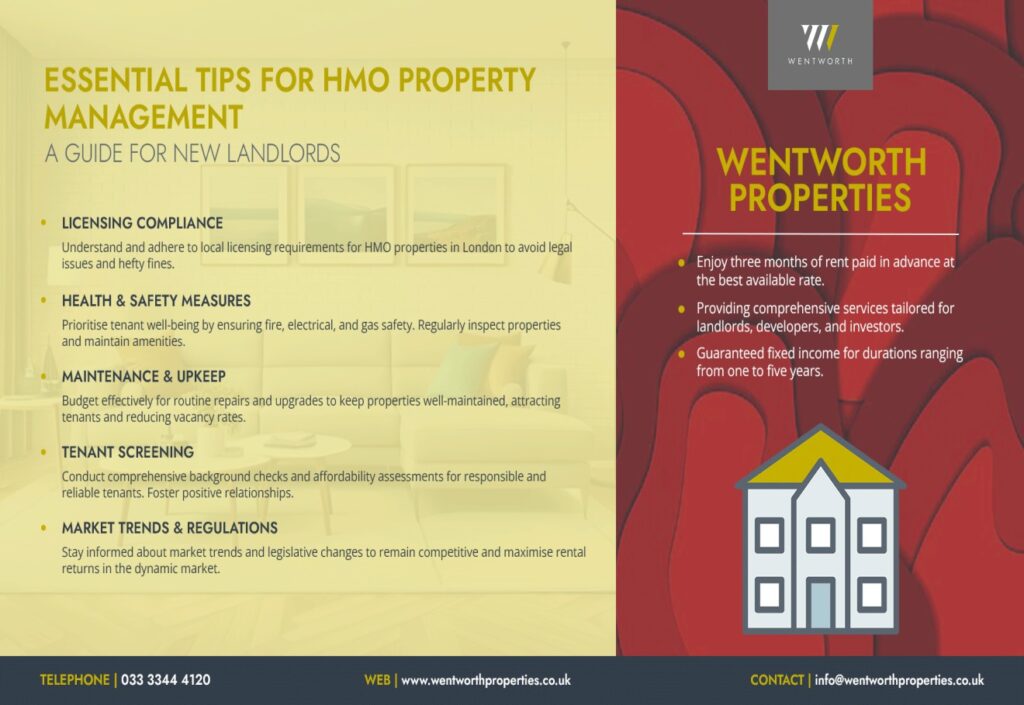
Avoiding Common Pitfalls: Essential Advice for Landlords New to HMO Property Management
Becoming a landlord in London can be a rewarding endeavour, especially in the realm of housing in Multiple Occupation (HMO) properties. However, managing HMO properties in the bustling capital comes with its own unique set of challenges. For landlords new to this dynamic market, understanding the common pitfalls and how to avoid them is crucial for success
If you are one of these new landlords and want to avoid these hassles, then this blog can help you. Here, we will focus on some of the common pitfalls that landlords may encounter at the time of HMO Property Management in London. Further, this blog highlights essential advice on how to navigate them effectively.

Understanding HMO Property Management in London
HMO properties are residential properties where three or more tenants from different households share facilities such as kitchens, bathrooms, or living areas. In London,
HMOproperties play a vital role in providing affordable housing options for tenants, particularly in areas with high demand and limited supply.
In 2021, approximately 2.4% of residences in London were registered as vacant for Council Tax assessment, marking a rise from previous years’ figures of 2.13%. Moreover, London boroughs issued mandatory licences for 17,645 Homes in Multiple Occupations (HMOs) during the same year. However, this number represents only a fraction of the overall count of HMOs in the city.
In this regard, managing HMO properties in London requires landlords to adhere to specific regulations and standards to ensure the safety, well-being, and rights of tenants.
Source: https://www.london.gov.uk/sites/default/files/2023-10/Housing%20in%20London%202022.pdf
Common Pitfalls for New Landlords in London
1.Ignoring licencing Requirements:
One of the most common pitfalls for new landlords entering the HMO market in London is disregarding or overlooking licensing requirements. London has strict regulations governing HMO properties, and depending on the location and size of the property, mandatory licensing from the local authority may be required.
- If your property meets the criteria outlined in the standard test, self-contained flat test, or converted building test under Section 254 of the Housing Act 2004 and is inhabited by five or more individuals, obtaining a mandatory HMO licence is necessary.
- Failing to obtain these necessary licences can result in hefty fines, legal consequences, or even prosecution.
Therefore, it’s imperative for new landlords in London to thoroughly research and understand the licensing regulations applicable to their HMO property. For HMO property management, it helps to ensure
Source: https://www.londonpropertylicensing.co.uk/mandatory-hmo-licensing/#:~:text=You%20will%20need%20a%20mandatory,by%20five%20or%20more%20people. compliance from the outset.

2. Neglecting Health and Safety Obligations
Ensuring the health and safety of tenants in HMO properties is of utmost importance in London’s competitive rental market. In this regard, neglecting health and safety obligations can jeopardise the well-being of tenants. Also, it can lead to legal liabilities and reputational damage for landlords. Common health and safety issues at HMO properties include:
- fire safety
- electrical safety
- gas safety
- adequate provision of amenities such as heating and hot water.
In this regard, new landlords in London need to prioritise compliance with health and safety regulations. Besides, it is necessary to undertake regular inspections and maintenance to mitigate risks and ensure the safety of their tenants.
Underestimating Maintenance and Upkeep Costs
Another common pitfall for new landlords in London is underestimating the ongoing maintenance and upkeep costs associated with managing HMO properties. London’s fast-paced rental market demands high-quality accommodation, and tenants expect well-maintained properties with modern amenities.
So, new landlords must budget effectively for routine maintenance, repairs, and upgrades to ensure their HMO properties remain attractive and competitive in the market. However, failure to invest in property maintenance can lead to tenant dissatisfaction, increased vacancy rates, and diminished rental yields.
Overlooking Tenant Screening and Management:
Tenant selection and management are critical aspects of HMO property management in London. Overlooking thorough tenant screening processes can result in problematic tenants who may cause disturbances, damage property, or default on rent payments.
In this regard, new landlords need to conduct comprehensive background checks, reference checks, and affordability assessments to identify reliable and responsible tenants. Additionally, effective tenant management strategies are important-
- clear communication
- prompt response to maintenance requests
- and fair dispute resolution
These strategies are effective for fostering positive landlord-tenant relationships and minimising conflicts.
Failing to Adapt to Market Trends and Regulations:
London’s rental market is constantly evolving, with changing trends, regulations, and tenant preferences shaping the landscape. Let’s check out these evolving market trends:
- Rental growth in London lags behind other parts of the country, yet buy-to-let properties in the capital maintain the highest average rents.
- Across the UK, the average monthly rent increased to £1,280 by the end of 2023, while the London rental market soared to a new high of £2,630.
- In areas like the London Borough of Westminster and neighbouring Kensington and Chelsea, the average rent approaches £3,000 per month.
- However, it’s worth noting that economic conditions can shift rapidly, as seen with the tumultuous budget announcements by Liz Truss and Kwasi Kwarteng in 2022.
Failing to adapt to these market trends and regulatory changes can leave landlords at a disadvantage and hinder their long-term success. In this regard, new landlords should stay informed about market dynamics, emerging trends, and legislative developments affecting HMO properties in London. So, proactively adapting to market trends and regulatory requirements can help landlords stay competitive, attract quality tenants, and maximise rental returns.
Source: https://intracapitalestates.co.uk/lettings/london-rental-market-forecast/

Summary
Managing HMO properties in London offers lucrative opportunities for landlords, but it also comes with its fair share of challenges and pitfalls. So, by understanding and addressing common pitfalls such as licencing requirements, health and safety obligations, maintenance costs, tenant management, and market dynamics, new landlords can navigate the complexities of HMO property management effectively.
Besides, with careful planning, diligence, and a commitment to compliance and tenant satisfaction, landlords can unlock the full potential of their HMO properties in London and achieve success in the competitive rental market.
Are you ready to navigate the complexities of managing HMO properties? Let Wentworth Properties, your trusted HMO management company in London guide you through the process seamlessly. Whether you’re new to HMO management or looking to expand your portfolio, our expert team can help you navigate the additional rules and licencing requirements with ease. Contact us today to learn more and take the first step towards successful HMO property management

Partner with Wentworth Properties to ensure compliance and success in managing your HMO properties. Contact us today!
- Maximise Your Rental Returns: Let Wentworth Properties guide you through market trends and regulations to boost your rental income. Get in touch for expert advice.
- Streamline Your HMO Property Management: Our experienced team at Wentworth Properties can help you handle additional rules and licencing requirements. Reach out to us now!
- Unlock the Full Potential of Your HMO Properties: Trust Wentworth Properties to manage your HMO properties effectively and efficiently. Contact us to start your journey towards success!
FAQ:
A: Licencing requirements vary depending on the location and size of the property. Generally, properties with five or more occupants require a mandatory HMO license. Research local regulations to ensure compliance and avoid penalties.
A: Prioritise regular inspections and maintenance for fire, electrical, and gas safety. Ensure proper amenities like heating and hot water are available. Following safety regulations helps protect tenants and prevents legal liabilities.
A: Keep up with local news, industry reports, and legal updates affecting HMO properties. Staying informed helps landlords adapt to market trends, remain competitive, and maximise rental returns.
Guaranteed rent companies handle various property management tasks, including tenant screening, rent collection, and maintenance, thereby minimising concerns related to late payments and eviction costs for landlords. By outsourcing these administrative duties to experienced professionals, landlords can enjoy peace of mind and focus on maximising their investment returns.
When selecting a guaranteed rental company in London, landlords should consider factors such as the company’s reputation, track record, and level of expertise in the local rental market. Additionally, landlords should thoroughly review the terms and conditions of the contract, including rental rates, duration, and any additional services offered, to ensure alignment with their investment goals and preferences.



